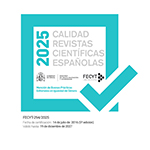Romulus und seine Kinder. Das Groteske als Verfremdung
Abstract
In his theoretical writings Friedrich Dürrenmatt describes the world as opaque and, henceforth, the traditional forms of theater such as the tragedy as inappropriate. The analysis opposes Dürrenmatt´s skepticism to Brecht´s marxist realism. While Brecht views reality as a process of cause and effect, Dürrenmatt juxtaposes reality and fictitious contra-reality. His definition of the grotesque as the central element of comedy calls particular attention. The discussion of the ahistoricity of the heroes in Romulus der Große and their way of refuting historical processes establishes the grotesque as the only appropriate form to narrate the present.Downloads
Article download
License
In order to support the global exchange of knowledge, the journal Revista de Filología Alemana is allowing unrestricted access to its content as from its publication in this electronic edition, and as such it is an open-access journal. The originals published in this journal are the property of the Complutense University of Madrid and any reproduction thereof in full or in part must cite the source. All content is distributed under a Creative Commons Attribution 4.0 use and distribution licence (CC BY 4.0). This circumstance must be expressly stated in these terms where necessary. You can view the summary and the complete legal text of the licence.










